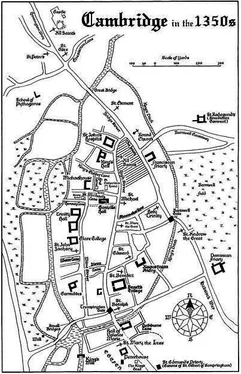The second man was Giles Abigny, who had once been Bartholomew’s room-mate. Gone were the flowing yellow locks and the mischievous smile of the student in his twenties. Abigny in his thirties was crop-haired, sombre and wore the drab garments of a law-court clerk – a blue over-tunic, called a cote-hardie, with buttoned sleeves, and a dark mantle with a metal clasp on the right shoulder. His brown hat was high crowned, and was decorated with a feather that had seen better days. He was heavier, too, indicating that he spent rather more time at the dinner table now than when he had been younger. He clasped Bartholomew’s hand warmly, and promised that they would talk later, once they were settled and comfortable.
The woman who accompanied Turke, however, was not Philippa. She was Turke’s wife; it was evident in the proprietorial way in which he handled her. She was as tall as Philippa had been, but much larger. Her expensive clothes could not hide the fact that she was both pear shaped and the owner of several chins. Her hair was completely concealed under a matronly wimple, and her skin was blemished and tired, although some attempt had been made to disguise the fact with chalk paste. She was, in short, middle aged, overweight and unattractive.
Bartholomew recalled Edith’s words – that she had not wanted him to ‘find out like this’. The truth became painfully clear: Philippa was no longer Turke’s wife, and the man had remarried. Edith had not wanted Bartholomew to learn that Philippa was dead by meeting the next Mistress Turke. The physician felt a surge of sadness for the young woman with the golden hair and blue eyes, who had gone to London in search of a better life than he could offer her. He hoped she had found happiness before she had died.
‘Hello, Matt,’ said the woman, approaching him with a smile. ‘Do you not remember me? I am Philippa.’
Langelee was about to lead his guests across the yard and into the hall, when Agatha strode up to him and announced in a loud whisper that the boar was ‘still bloody’ and that the meal would not be ready for some time. Rather than wait indefinitely in the hall until the beast rotating over the kitchen fire was cooked to Agatha’s exacting standards, Langelee decided to take the guests to his own quarters. Gray and Quenhyth were dispatched to stoke up the fire and remove any soiled linen that might be lying around, while Langelee procrastinated in the yard until Gray’s hand appeared in the window to let him know that the chambers were presentable.
It was a colourful group that crowded into the two rooms, with the merchants and Sheriff adding yellows, greens and blues (and Robin’s lilac and orange) to the scholars’ ceremonial reds. The atmosphere was tense, however. Morice seemed uneasy with his predecessor in such close proximity, while Tulyet barely acknowledged that Morice was there, giving the impression he felt little but contempt for the man.
Robin of Grantchester looked hopelessly out of place. He stood near the hearth drinking steadily and eyeing the wine goblet as though he might take it with him when he left. Bartholomew tried exchanging pleasantries, but abandoned his efforts when Robin accused him of attempting to steal his professional secrets. Refraining from retorting that Robin had no secrets of any kind that Bartholomew would want to know, the physician backed away, gesturing to Suttone that he should entertain the man. Suttone obliged, and Bartholomew heard him informing the surgeon that the Death would soon return to Cambridge, and that he had better be prepared for it. This grim news was met with some pleasure by Robin, who had made a lot of money the last time the plague had raged.
Meanwhile, it was painfully obvious that Oswald Stanmore did not like the merchant to whom he had opened his house that Christmas. Edith tried hard to keep the peace, interrupting with a change of topic whenever one man looked set to offend the other and keeping the discussions lighthearted and uncontroversial. Abigny sat on a stool in a corner and watched them with cynical amusement, while Philippa was offered Langelee’s best chair, which faced the fire and effectively absolved her from the general conversation. Clippesby crouched at her feet, like a lap-dog, and told her about the final confession the boar had made before it was dispatched to become the centrepiece for the feast. Bartholomew was grateful to Clippesby, because the musician’s deranged chatter meant that he was not yet obliged to talk to Philippa himself. Instead he went to speak to Abigny.
‘Giles,’ he said warmly. ‘We have not had news from you for years. What have you been doing since the plague?’
‘The plague years were good times,’ said Abigny fondly. ‘I was carefree then – with only myself to worry about.’
‘Are you married, then?’ asked Bartholomew politely.
Abigny shook his head. ‘But I am betrothed, and will be wed this summer.’
‘Then you should not stay away from her too long,’ said Bartholomew, not without rancour. ‘Or you may find that she has grown tired of waiting and has abandoned you for a fishmonger.’
Abigny shot the physician a rueful smile. ‘I was sorry when Philippa told me she had broken her trust with you. Believe me, I would rather have a scholar for a brother than a fish merchant. At least my home would not smell of eels.’
‘You live with them?’ asked Bartholomew, surprised.
Abigny’s smile was bitter. ‘You should have warned me to pay more attention to my studies, Matt. When I came to seek employment in London, I found my knowledge lacking. I had no choice but to throw myself on the mercy of my brother-in-law.’
‘I thought your parents left you a fortune.’
‘A fortune does not last long in the hands of a man with fickle friends and a fondness for women. I squandered my inheritance, and when I was eventually obliged to find work I discovered I had forgotten – or had never learned – my lessons here. Walter bought me a post, as part of his wooing of Philippa, but it is not a very good one.’
‘I see,’ said Bartholomew, a little disconcerted by Abigny’s blunt confidences.
‘I doubt it,’ said Abigny. ‘I go to the law courts every day and file records no one will ever want again. Then I go home to Turke’s house for my bed and my meat, and spend my evenings watching him turn my sister into a bore.’
‘Is she happy?’ asked Bartholomew, glancing to where Philippa was listening to Clippesby’s ramblings with an expression that combined disbelief and unease. He supposed someone should rescue her, for he knew that conversations with Clippesby could be daunting to those unused to them.
‘In general. Walter is not a dashing physician with black curls and a merry laugh, but he is enormously wealthy, and well placed to wrangle token employment for indolent brothers.’
Bartholomew felt Abigny should either earn himself the kind of high-paying post that he obviously thought he needed or marry his fiancée before she saw what she was letting herself in for. Seeing a man wallow in such self-pity was not pleasant, and he was half inclined to suggest Abigny should pull himself together.
‘Why are you here?’ he asked instead, good manners prevailing. ‘If you dislike being with Walter and Philippa in their home, their absence should have given you some freedom.’
‘It was tempting, believe me. But Philippa represents much that is good in my life, and if she wants to make a pilgrimage to Walsingham in the depths of winter, then it is my duty to travel with her and ensure she comes to no harm.’ He gave a sudden grin, and for a moment Bartholomew glimpsed the rakish scholar he had once known. ‘Remember my skill with the sword, Matt? I was in the thick of many a brawl with the town’s apprentices.’
Читать дальше












